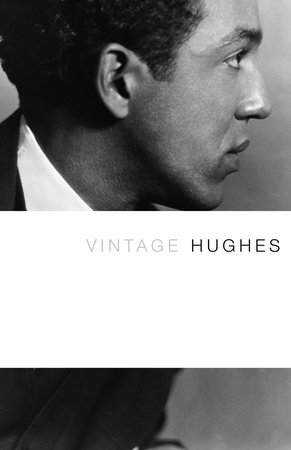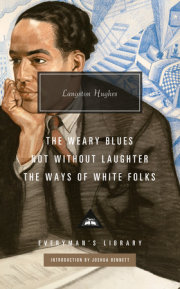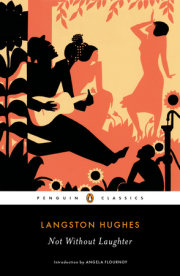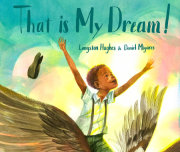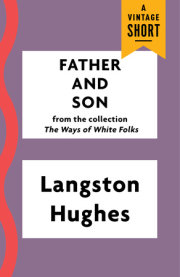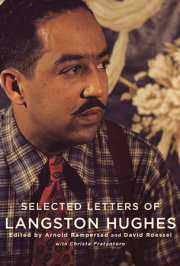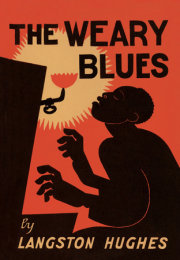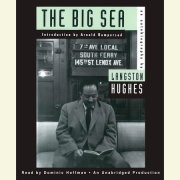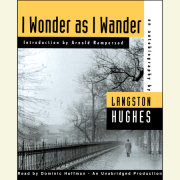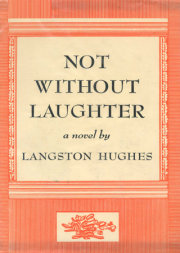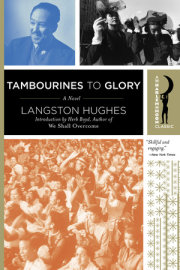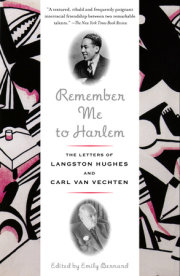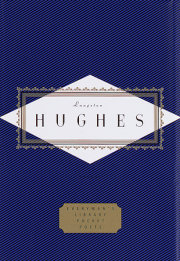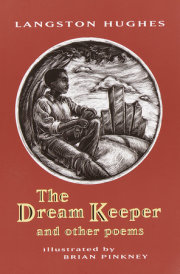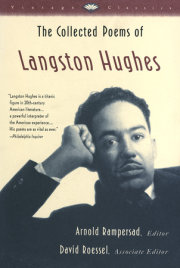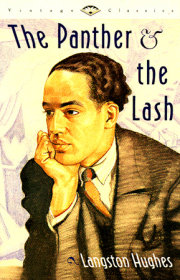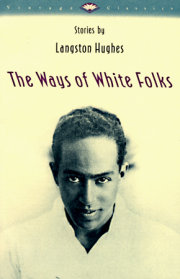The Negro Speaks of RiversI've known rivers:
I've known rivers ancient as the world and older than the flow of human blood in human veins.
My soul has grown deep like the rivers.
I bathed in the Euphrates when dawns were young.
I built my hut near the Congo and it lulled me to sleep.
I looked upon the Nile and raised the pyramids above it.
I heard the singing of the Mississippi when Abe Lincoln went down to New Orleans, and I've seen its muddy bosom turn all golden in the sunset.
I've known rivers:
Ancient, dusky rivers.
My soul has grown deep like the rivers.
Aunt Sue's StoriesAunt Sue has a head full of stories.
Aunt Sue has a whole heart full of stories.
Summer nights on the front porch
Aunt Sue cuddles a brown-faced child to her bosom
And tells him stories.
Black slaves
Working in the hot sun,
And black slaves
Walking in the dewy night,
And black slaves
Singing sorrow songs on the banks of a mighty river
Mingle themselves softly
In the flow of old Aunt Sue's voice,
Mingle themselves softly
In the dark shadows that cross and recross
Aunt Sue's stories.
And the dark-faced child, listening,
Knows that Aunt Sue's stories are real stories.
He knows that Aunt Sue never got her stories
Out of any book at all,
But that they came
Right out of her own life.
The dark-faced child is quiet
Of a summer night
Listening to Aunt Sue's stories.
NegroI am a Negro:
Black as the night is black,
Black like the depths of my Africa.
I've been a slave:
Caesar told me to keep his door-steps clean.
I brushed the boots of Washington.
I've been a worker:
Under my hands the pyramids arose.
I made mortar for the Woolworth Building.
I've been a singer:
All the way from Africa to Georgia
I carried my sorrow songs.
I made ragtime.
I've been a victim:
The Belgians cut off my hands in the Congo.
They lynch me still in Mississippi.
I am a Negro:
Black as the night is black,
Black like the depths of my Africa.
Mexican Market WomanThis ancient hag
Who sits upon the ground
Selling her scanty wares
Day in, day round,
Has known high wind-swept mountains,
And the sun has made
Her skin so brown.
The SouthThe lazy, laughing South
With blood on its mouth.
The sunny-faced South,
Beast-strong,
Idiot-brained.
The child-minded South
Scratching in the dead fire's ashes
For a Negro's bones.
Cotton and the moon,
Warmth, earth, warmth,
The sky, the sun, the stars,
The magnolia-scented South.
Beautiful, like a woman,
Seductive as a dark-eyed whore,
Passionate, cruel,
Honey-lipped, syphilitic-
That is the South.
And I, who am black, would love her
But she spits in my face.
And I, who am black,
Would give her many rare gifts
But she turns her back upon me.
So now I seek the North-
The cold-faced North,
For she, they say,
Is a kinder mistress,
And in her house my children
May escape the spell of the South.
Mother to SonWell, son, I'll tell you:
Life for me ain't been no crystal stair.
It's had tacks in it,
And splinters,
And boards torn up,
And places with no carpet on the floor-
Bare.
But all the time
I'se been a-climbin' on,
And reachin' landin's,
And turnin' corners,
And sometimes goin' in the dark
Where there ain't been no light.
So boy, don't you turn back.
Don't you set down on the steps
'Cause you finds it's kinder hard.
Don't you fall now-
For I'se still goin', honey,
I'se still climbin',
And life for me ain't been no crystal stair.
When Sue Wears RedWhen Susanna Jones wears red
Her face is like an ancient cameo
Turned brown by the ages.
Come with a blast of trumpets,
Jesus!
When Susanna Jones wears red
A queen from some time-dead Egyptian night
Walks once again.
Blow trumpets,
Jesus!
And the beauty of Susanna Jones in red
Burns in my heart a love-fire sharp like pain.
Sweet silver trumpets,
Jesus!
A Black PierrotI am a black Pierrot:
She did not love me,
So I crept away into the night
And the night was black, too.
I am a black Pierrot:
She did not love me,
So I wept until the dawn
Dripped blood over the eastern hills
And my heart was bleeding, too.
I am a black Pierrot:
She did not love me,
So with my once gay-colored soul
Shrunken like a balloon without air,
I went forth in the morning
To seek a new brown love.
My PeopleThe night is beautiful,
So the faces of my people.
The stars are beautiful,
So the eyes of my people.
Beautiful, also, is the sun.
Beautiful, also, are the souls of my people.
Dream VariationsTo fling my arms wide
In some place of the sun,
To whirl and to dance
Till the white day is done.
Then rest at cool evening
Beneath a tall tree
While night comes on gently,
Dark like me-
That is my dream!
To fling my arms wide
In the face of the sun,
Dance! Whirl! Whirl!
Till the quick day is done.
Rest at pale evening . . .
A tall, slim tree . . .
Night coming tenderly
Black like me.
Troubled WomanShe stands
In the quiet darkness,
This troubled woman
Bowed by
Weariness and pain
Like an
Autumn flower
In the frozen rain,
Like a
Wind-blown autumn flower
That never lifts its head
Again.
I, Too
I, too, sing America.
I am the darker brother.
They send me to eat in the kitchen
When company comes,
But I laugh,
And eat well,
And grow strong.
Tomorrow,
I'll be at the table
When company comes.
Nobody'll dare
Say to me,
"Eat in the kitchen,"
Then.
Besides,
They'll see how beautiful I am
And be ashamed-
I, too, am America.
The Weary BluesDroning a drowsy syncopated tune,
Rocking back and forth to a mellow croon,
I heard a Negro play.
Down on Lenox Avenue the other night
By the pale dull pallor of an old gas light
He did a lazy sway. . . .
He did a lazy sway. . . .
To the tune o' those Weary Blues.
With his ebony hands on each ivory key
He made that poor piano moan with melody.
O Blues!
Swaying to and fro on his rickety stool
He played that sad raggy tune like a musical fool.
Sweet Blues!
Coming from a black man's soul.
O Blues!
In a deep song voice with a melancholy tone
I heard that Negro sing, that old piano moan-
"Ain't got nobody in all this world,
Ain't got nobody but ma self.
I's gwine to quit ma frownin'
And put ma troubles on the shelf."
Thump, thump, thump, went his foot on the floor.
He played a few chords then he sang some more-
"I got the Weary Blues
And I can't be satisfied.
Got the Weary Blues
And can't be satisfied-
I ain't happy no mo'
And I wish that I had died."
And far into the night he crooned that tune.
The stars went out and so did the moon.
The singer stopped playing and went to bed
While the Weary Blues echoed through his head.
He slept like a rock or a man that's dead.
AmericaLittle dark baby,
Little Jew baby,
Little outcast,
America is seeking the stars,
America is seeking tomorrow.
You are America.
I am America
America-the dream,
America-the vision.
America-the star-seeking I.
Out of yesterday
The chains of slavery;
Out of yesterday,
The ghettos of Europe;
Out of yesterday,
The poverty and pain of the old, old world,
The building and struggle of this new one,
We come
You and I,
Seeking the stars.
You and I,
You of the blue eyes
And the blond hair,
I of the dark eyes
And the crinkly hair.
You and I
Offering hands
Being brothers,
Being one,
Being America.
You and I.
And I?
Who am I?
You know me:
I am Crispus Attucks at the Boston Tea Party;
Jimmy Jones in the ranks of the last black troops
marching for democracy.
I am Sojourner Truth preaching and praying
for the goodness of this wide, wide land;
Today's black mother bearing tomorrow's America.
Who am I?
You know me,
Dream of my dreams,
I am America.
I am America seeking the stars.
America-
Hoping, praying
Fighting, dreaming.
Knowing
There are stains
On the beauty of my democracy,
I want to be clean.
I want to grovel
No longer in the mire.
I want to reach always
After stars.
Who am I?
I am the ghetto child,
I am the dark baby,
I am you
And the blond tomorrow
And yet
I am my one sole self,
America seeking the stars.
CrossMy old man's a white old man
And my old mother's black.
If ever I cursed my white old man
I take my curses back.
If ever I cursed my black old mother
And wished she were in hell,
I'm sorry for that evil wish
And now I wish her well.
My old man died in a fine big house.
My ma died in a shack.
I wonder where I'm gonna die,
Being neither white nor black?
Young SailorHe carries
His own strength
And his own laughter,
His own today
And his own hereafter-
This strong young sailor
Of the wide seas.
What is money for?
To spend, he says.
And wine?
To drink.
And women?
To love.
And today?
For joy.
And the green sea
For strength,
And the brown land
For laughter.
And nothing hereafter.
JoyI went to look for Joy,
Slim, dancing Joy,
Gay, laughing Joy,
Bright-eyed Joy-
And I found her
Driving the butcher's cart
In the arms of the butcher boy!
Such company, such company,
As keeps this young nymph, Joy!
Ruby BrownShe was young and beautiful
And golden like the sunshine
That warmed her body.
And because she was colored
Mayville had no place to offer her,
Nor fuel for the clean flame of joy
That tried to burn within her soul.
One day,
Sitting on old Mrs. Latham's back porch
Polishing the silver,
She asked herself two questions
And they ran something like this:
What can a colored girl do
On the money from a white woman's kitchen?
And ain't there any joy in this town?
Now the streets down by the river
Know more about this pretty Ruby Brown,
And the sinister shuttered houses of the bottoms
Hold a yellow girl
Seeking an answer to her questions.
The good church folk do not mention
Her name any more.
But the white men,
Habitués of the high shuttered houses,
Pay more money to her now
Than they ever did before,
When she worked in their kitchens.
Back Luck CardCause you don't love me
Is awful, awful hard.
Gypsy done showed me
My bad luck card.
There ain't no good left
In this world for me.
Gypsy done tole me-
Unlucky as can be.
I don't know what
Po' weary me can do.
Gypsy says I'd kill my self
If I was you.
Feet o' JesusAt the feet o' Jesus,
Sorrow like a sea.
Lordy, let yo' mercy
Come driftin' down on me.
At the feet o' Jesus
At yo' feet I stand.
O, ma little Jesus,
Please reach out yo' hand.
A House in TaosRainThunder of the Rain God:
And we three
Smitten by beauty.
Thunder of the Rain God:
And we three
Weary, weary.
Thunder of the Rain God:
And you, she, and I
Waiting for nothingness.
Do you understand the stillness
Of this house
In Taos
Under the thunder of the Rain God?
SunThat there should be a barren garden
About this house in Taos
Is not so strange,
But that there should be three barren hearts
In this one house in Taos-
Who carries ugly things to show the sun?
MoonDid you ask for the beaten brass of the moon?
We can buy lovely things with money,
You, she, and I,
Yet you seek,
As though you could keep,
This unbought loveliness of moon.
WindTouch our bodies, wind.
Our bodies are separate, individual things.
Touch our bodies, wind,
But blow quickly
Through the red, white, yellow skins
Of our bodies
To the terrible snarl,
Not mine,
Not yours,
Not hers,
But all one snarl of souls.
Blow quickly, wind,
Before we run back
Into the windlessness-
With our bodies-
Into the windlessness
Of our house in Taos.
Brass SpittoonsClean the spittoons, boy.
Detroit,
Chicago,
Atlantic City,
Palm Beach.
Clean the spittoons.
The steam in hotel kitchens,
And the smoke in hotel lobbies,
And the slime in hotel spittoons:
Part of my life.
Hey, boy!
A nickel,
A dime,
A dollar,
Two dollars a day.
Hey, boy!
A nickel,
A dime,
A dollar,
Two dollars
Buys shoes for the baby.
House rent to pay.
Gin on Saturday,
Church on Sunday.
My God!
Babies and gin and church
and women and Sunday
all mixed up with dimes and
dollars and clean spittoons
and house rent to pay.
Hey, boy!
A bright bowl of brass is beautiful to the Lord.
Bright polished brass like the cymbals
Of King David's dancers,
Like the wine cups of Solomon.
Hey, boy!
A clean spittoon on the altar of the Lord.
A clean bright spittoon all newly polished,-
At least I can offer that.
Come 'ere, boy!
Midnight Dancer(To a Black Dancer in "The Little Savoy")Wine-maiden
Of the jazz-tuned night,
Lips
Sweet as purple dew,
Breasts
Like the pillows of all sweet dreams,
Who crushed
The grapes of joy
And dripped their juice
On you?
Harlem Night SongCome,
Let us roam the night together
Singing.
I love you.
Across
The Harlem roof-tops
Moon is shining.
Night sky is blue.
Stars are great drops
Of golden dew.
Down the street
A band is playing.
I love you.
Come,
Let us roam the night together
Singing.
ArdellaI would liken you
To a night without stars
Were it not for your eyes.
I would liken you
To a sleep without dreams
Were it not for your songs.
Port TownHello, sailor boy,
In from the sea!
Hello, sailor,
Come with me!
Come on drink cognac.
Rather have wine?
Come here, I love you.
Come and be mine.
Lights, sailor boy,
Warm, white lights.
Solid land, kid.
Wild, white nights.
Come on, sailor,
Out o' the sea.
Let's go, sweetie!
Come with me.
Death of an Old SeamanWe buried him high on a windy hill,
But his soul went out to sea.
I know, for I heard, when all was still,
His sea-soul say to me:
Put no tombstone at my head,
For here I do not make my bed.
Strew no flowers on my grave,
I've gone back to the wind and wave.
Do not, do not weep for me,
For I am happy with my sea.
Copyright © 2004 by Langston Hughes. All rights reserved. No part of this excerpt may be reproduced or reprinted without permission in writing from the publisher.

